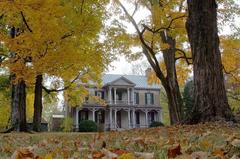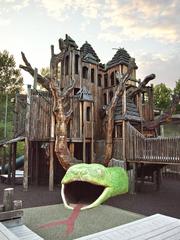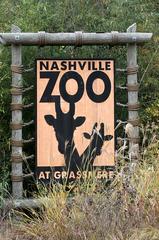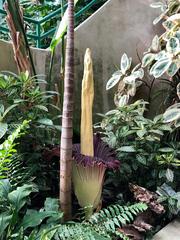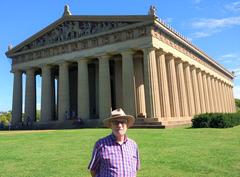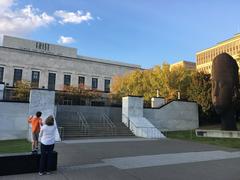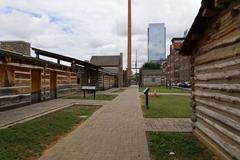
Visiting Zoo Road in Nashville: Tickets, Hours, and Tips
Date: 17/07/2024
Introduction
Zoo Road in Nashville, Tennessee, is not merely a route—it’s a passage to one of the city’s most cherished landmarks, the Nashville Zoo at Grassmere. Originally established as Grassmere Wildlife Park in 1991, the zoo merged with its current site in 1996, leading to substantial improvements and expansions. Today, it serves as a hub for wildlife conservation, education, and family-friendly activities.
This guide will explore the zoo’s historical significance, cultural and economic impact, visitor experiences, and practical tips for making the most of your visit. Whether you’re a local or a tourist, Zoo Road offers a unique blend of history, education, and entertainment. From the Expedition Peru exhibit to the Kangaroo Kickabout and the Historic Grassmere Home and Farm, there is something for everyone. This guide will also cover essential visitor information, such as ticket prices, visiting hours, and travel tips, to ensure you have a seamless and enjoyable experience.
Table of Contents
- [Origins and Development of Zoo Road](#origins-and-development-of-zoo-roadorigins-and-development-of-zoo-road)
- [Early Beginnings of the Nashville Zoo](#early-beginnings-of-the-nashville-zooearly-beginnings-of-the-nashville-zoo)
- [Transition to the Nashville Zoo](#transition-to-the-nashville-zootransition-to-the-nashville-zoo)
- [Expansion and Growth](#expansion-and-growthexpansion-and-growth)
- [Recent Developments](#recent-developmentsrecent-developments)
- [Visitor Information](#visitor-informationvisitor-information)
- [Nashville Zoo Visiting Hours](#nashville-zoo-visiting-hoursnashville-zoo-visiting-hours)
- [Nashville Zoo Tickets](#nashville-zoo-ticketsnashville-zoo-tickets)
- [Visitor Tips for Zoo Road and Nashville Zoo](#visitor-tips-for-zoo-road-and-nashville-zoovisitor-tips-for-zoo-road-and-nashville-zoo)
- [Educational Programs and Events](#educational-programs-and-eventseducational-programs-and-events)
- [Conservation Efforts](#conservation-effortsconservation-efforts)
- [Future Plans](#future-plansfuture-plans)
- [Frequently Asked Questions](#frequently-asked-questionsfrequently-asked-questions)
- [Call to Action](#call-to-actioncall-to-action)
- [Conclusion](#conclusionconclusion)
- [Sources](#sourcessources)
Nashville Zoo - History, Visiting Hours, Tickets, and Travel Tips
Origins and Development of Zoo Road
Zoo Road, located in Nashville, Tennessee, is a significant thoroughfare that leads to one of the city’s most beloved attractions, the Nashville Zoo. The road itself has evolved over the years, paralleling the growth and development of the zoo. Initially, Zoo Road was a simple access route, but as the zoo expanded, so did the infrastructure surrounding it. The road has been upgraded multiple times to accommodate the increasing number of visitors, ensuring a smooth and pleasant journey to the zoo.
Early Beginnings of the Nashville Zoo
The Nashville Zoo’s history dates back to 1991 when it was initially established as Grassmere Wildlife Park. The park was located on the historic Grassmere property, which was bequeathed to the city by the Croft sisters, Margaret and Elise, with the stipulation that the land be used for zoological purposes. The Croft sisters were passionate about wildlife conservation, and their vision laid the foundation for what would become the Nashville Zoo.
Transition to the Nashville Zoo
In 1996, the Nashville Zoo merged with Grassmere Wildlife Park, leading to the creation of the modern Nashville Zoo at Grassmere. This merger was a pivotal moment in the zoo’s history, as it brought together resources and expertise from both entities, allowing for significant improvements and expansions. The zoo’s mission was redefined to focus on conservation, education, and providing an engaging experience for visitors.
Expansion and Growth
Since its establishment, the Nashville Zoo has undergone numerous expansions and renovations. One of the most notable developments was the addition of the African Savannah exhibit in 2001, which introduced visitors to a variety of African species, including giraffes, zebras, and ostriches. This exhibit was a major attraction and significantly boosted the zoo’s popularity.
In 2006, the zoo opened the Unseen New World exhibit, which showcased animals from Central and South America. This exhibit featured a variety of reptiles, amphibians, and invertebrates, providing visitors with a unique opportunity to learn about these often-overlooked creatures.
Recent Developments
In recent years, the Nashville Zoo has continued to expand and improve its facilities. In 2019, the zoo opened the Expedition Peru exhibit, which features Andean bears, pudus, and other South American species. This exhibit was designed to mimic the natural habitats of these animals, providing them with a comfortable and enriching environment.
The zoo has also made significant strides in its conservation efforts. In 2020, the zoo’s veterinary team successfully bred and released several endangered species, including the Eastern hellbender and the clouded leopard, into their natural habitats. These efforts have been recognized by various conservation organizations, highlighting the zoo’s commitment to preserving wildlife.
Visitor Information
Nashville Zoo Visiting Hours
The Nashville Zoo is open year-round. The standard visiting hours are from 9:00 AM to 4:00 PM, but these hours may vary during special events and holidays. Always check the Nashville Zoo’s official website for the most up-to-date information.
Nashville Zoo Tickets
Tickets can be purchased online or at the gate. General admission prices are as follows:
- Adults (13+): $19
- Children (2-12): $14
- Seniors (65+): $16
The zoo also offers annual memberships, which provide unlimited access and additional benefits such as discounts on special events and merchandise.
Visitor Tips for Zoo Road and Nashville Zoo
- Best Time to Visit: The Nashville Zoo is open year-round, but the best time to visit is during the spring and fall when the weather is mild. Weekdays are generally less crowded than weekends, making for a more enjoyable experience.
- Getting There: Zoo Road is easily accessible by car, and there is ample parking available at the zoo. For those using public transportation, the Nashville MTA offers bus services that stop near the zoo entrance.
- Amenities: The zoo offers a variety of amenities, including dining options, gift shops, and stroller rentals. There are also several picnic areas where visitors can enjoy a meal in a scenic setting.
- Accessibility: The Nashville Zoo is committed to providing an accessible experience for all visitors. The zoo offers wheelchair rentals, and most exhibits are designed to be accessible to individuals with mobility impairments.
Educational Programs and Events
The Nashville Zoo offers a wide range of educational programs and events for visitors of all ages. These programs are designed to promote awareness and understanding of wildlife conservation.
- Zoo Camps: The zoo offers seasonal camps for children, providing them with hands-on learning experiences and the opportunity to interact with animals.
- Animal Encounters: Visitors can participate in animal encounters, where they can get up close and personal with some of the zoo’s residents. These encounters are led by knowledgeable staff who provide insights into the animals’ behaviors and habitats.
- Special Events: The zoo hosts a variety of special events throughout the year, including Boo at the Zoo, a Halloween-themed event, and Zoolumination, a holiday light display. These events offer unique experiences and are a great way to enjoy the zoo in a different setting.
Conservation Efforts
The Nashville Zoo is actively involved in numerous conservation initiatives, both locally and globally. The zoo’s conservation efforts focus on habitat preservation, species survival, and public education.
- Species Survival Plans: The zoo participates in the Association of Zoos and Aquariums’ Species Survival Plans, which aim to manage and conserve endangered species through cooperative breeding programs.
- Local Conservation: The zoo is involved in several local conservation projects, including efforts to protect native species such as the Eastern hellbender and the Tennessee purple coneflower.
- Global Initiatives: The zoo supports global conservation initiatives, including projects to protect the habitats of clouded leopards, red pandas, and other endangered species.
Future Plans
The Nashville Zoo has ambitious plans for the future, with several new exhibits and facilities in the works. These plans include the addition of a new African elephant exhibit, which will provide a larger and more naturalistic habitat for the elephants, and the expansion of the zoo’s veterinary and animal care facilities.
The zoo is also planning to enhance its educational programs and increase its focus on sustainability. These efforts will ensure that the Nashville Zoo continues to be a leader in wildlife conservation and education for years to come.
Frequently Asked Questions
- What are the Nashville Zoo’s opening hours? The zoo is open daily from 9:00 AM to 4:00 PM, though hours may vary during special events and holidays.
- How much are tickets to the Nashville Zoo? General admission prices are $19 for adults, $14 for children, and $16 for seniors. Annual memberships are also available.
- How can I get to the Nashville Zoo? Zoo Road is accessible by car with ample parking available. Public transportation options are also available via the Nashville MTA.
For more information about the Nashville Zoo and its offerings, visit the Nashville Zoo’s official website.
Call to Action
Don’t miss out on the latest updates and exclusive content! Download the Audiala mobile app, check out related posts, and follow us on social media.
Conclusion
In conclusion, Zoo Road and the Nashville Zoo at Grassmere offer a multifaceted experience that goes beyond mere entertainment. With its strong commitment to conservation, rich historical background, and a wide range of exhibits and activities, the zoo stands as a testament to Nashville’s dedication to wildlife preservation and education. From the African Savannah exhibit to the Veterinary Center, each attraction is designed to engage and educate visitors of all ages.
Whether you’re planning to visit during the mild seasons of spring and fall or looking to participate in special events like Boo at the Zoo and Zoolumination, there is always something new and exciting to explore. The zoo’s future plans promise even more enhancements, ensuring that it remains a top destination for years to come. For more information and updates, be sure to visit the Nashville Zoo’s official website and consider downloading the Audiala mobile app for exclusive content and travel tips.
Sources
- Nashville Zoo - History, Visiting Hours, Tickets, and Travel Tips, 2024, Nashville Zoo source
- Exploring Zoo Road - Your Guide to Nashville Zoo Visiting Hours, Tickets, and More, 2024, Nashville Zoo source
- Explore Key Attractions on Zoo Road - Nashville Zoo Visiting Hours, Tickets, Historical Sites, and More, 2024, Nashville Zoo source
